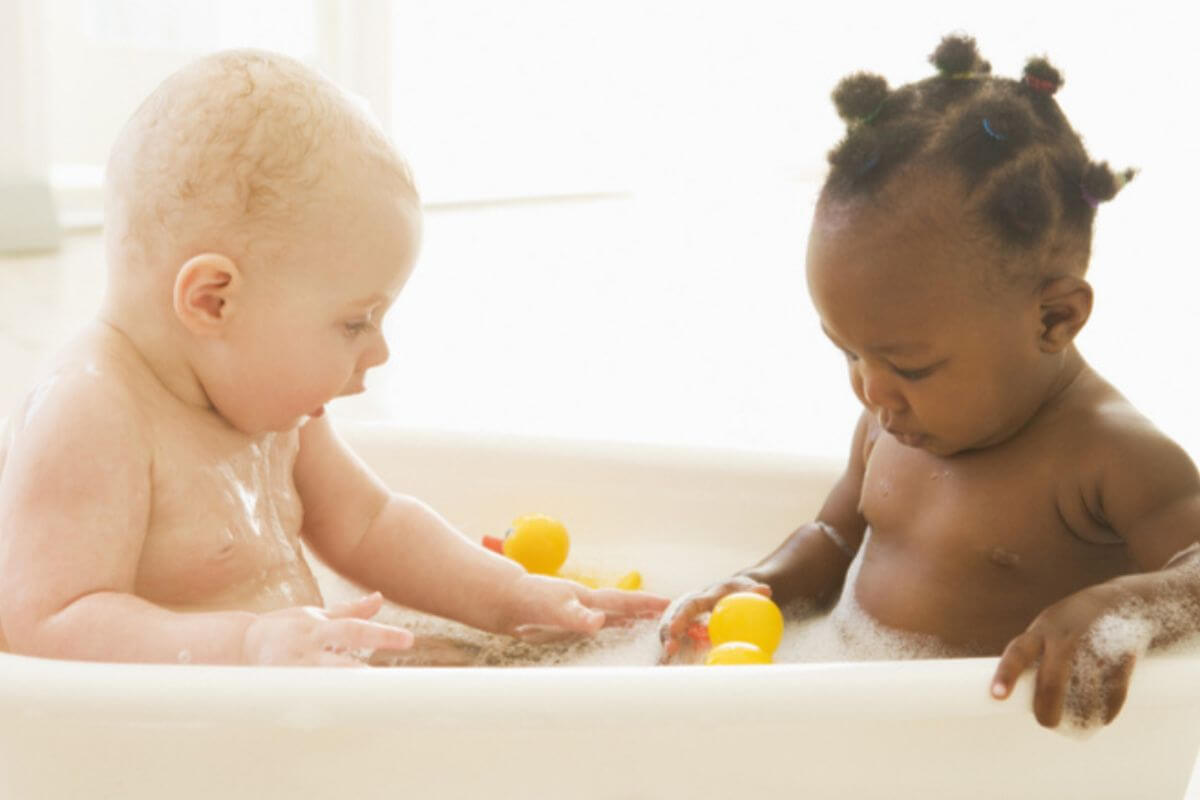The bedtime routine for a baby is a delicate dance of soothing activities, and for many parents, a warm bath is a cherished part of this routine. The age-old belief in the calming effect of baths on babies has been passed down through generations. But is there scientific merit to the notion that baths make babies sleepy? Let’s delve into the research and explore the intricate relationship between baths and a baby’s journey into dreamland.
The Ritual of the Evening Bath
Bathing a baby before bedtime is more than just a practical step in the hygiene routine. It’s a ritual embedded with sensory experiences that can play a significant role in signaling the transition from wakefulness to sleepiness. The warmth of the water, the gentle touch, and the calming ambiance create an environment conducive to relaxation.
The Warmth and Comfort Connection
One of the primary reasons baths are believed to induce sleepiness in babies is the soothing effect of warm water. Warmth has a comforting impact on the human body, promoting a sense of relaxation and tranquility. When a baby is immersed in a warm bath, it mimics the cozy environment of the womb, providing a familiar and calming sensation.
Regulating Circadian Rhythms
Baths also play a role in regulating a baby’s circadian rhythms. The body’s internal clock, influenced by factors like light and temperature, helps establish sleep-wake cycles. A warm bath in the evening may contribute to this natural rhythm, signaling to the baby’s body that it’s time to wind down and prepare for sleep.
Release of Tension and Stress
Babies, like adults, can experience tension and stress, especially after a day filled with new experiences and stimuli. Bath time serves as a gentle transition, allowing babies to release built-up tension. The soothing water, combined with the calming presence of a caregiver, creates a secure and nurturing environment where the baby can let go of the day’s stresses.
Incorporating Aromatherapy
The use of gentle, calming scents during bath time, such as lavender or chamomile, introduces an element of aromatherapy. These scents are believed to have relaxation-inducing properties, contributing to a peaceful atmosphere that can support the baby’s journey to sleep.
Parental Bonding and Comfort
The act of bathing is not only a sensory experience for the baby but also an opportunity for crucial parental bonding. The physical contact, eye contact, and soothing words exchanged during bath time strengthen the parent-child connection. This emotional comfort further aids in creating a sense of security and relaxation, laying the foundation for a peaceful sleep.

Practical Tips for a Sleep-Inducing Bath Routine:
- Consistency is Key: Establish a consistent bedtime routine, incorporating a warm bath at the same time each night.
- Use Gentle Products: Choose baby-friendly, hypoallergenic bath products with calming scents to enhance the soothing effect.
- Mind the Water Temperature: Ensure the water is comfortably warm, not too hot or too cold, to provide optimal relaxation.
- Dim the Lights: Create a tranquil environment by dimming the lights during bath time, signaling the approaching bedtime.
Conclusion: The Bedtime Ballet
While the connection between baths and sleepiness in babies is supported by both anecdotal evidence and scientific reasoning, it’s essential to acknowledge that individual responses vary. Some babies may find the bedtime bath especially calming, while others might not be as influenced by this ritual.
In the bedtime ballet of parenting, the warm bath stands as a gentle and cherished movement, contributing to the intricate choreography of helping a baby transition from wakefulness to a peaceful slumber. So, embrace the soothing symphony of water, warmth, and care, and may your baby’s bedtime routine be filled with tranquility and sweet dreams.
The Sleepy Soak Unveiled: Nurturing Bedtime Bliss
As parents, understanding the nuances of your baby’s response to a bedtime bath involves a blend of intuition, observation, and a touch of science. While the warm bath undoubtedly contributes to a calm and cozy atmosphere, let’s delve deeper into the intricacies that make the sleepy soak a cherished component of the bedtime ritual.
The Science Behind the Slumber: Cortisol and Melatonin Dynamics
Baths may impact the physiological aspects of sleep through the regulation of key hormones, specifically cortisol and melatonin. Cortisol, often associated with stress, tends to decrease with warmth and relaxation, while melatonin, the sleep-inducing hormone, may see an increase. The bedtime bath, therefore, becomes a natural ally in creating a conducive hormonal environment for a restful night.
Temperature’s Impact on Sleep Regulation
The temperature of the bathwater is a crucial factor in its sleep-inducing potential. Warm water has been shown to increase blood flow and relax muscles, setting the stage for a more tranquil bedtime experience. The subsequent cooling of the body post-bath mimics the natural drop in body temperature that occurs as the body prepares for sleep.
The Role of Routine: A Pavlovian Prelude to Sleep
Babies thrive on routine, and the bedtime bath establishes a Pavlovian association between the sensory experience of the warm water and the impending rest. The predictability of the bedtime routine creates a comforting pattern that signals to the baby’s brain that it’s time to wind down and prepare for sleep.
Sensory Stimulation and Neural Connections
Baths engage a baby’s senses, providing a multisensory experience that extends beyond the tactile sensation of water. The sound of splashing, the gentle touch during washing, and the subtle scents of bath products all contribute to neural stimulation. This sensory engagement can create positive associations with the bedtime routine, fostering an environment conducive to relaxation.
Transitioning from Day to Night: The Psychological Impact
The transition from the activities of the day to the calm of the evening is a crucial psychological aspect of the bedtime routine. A warm bath serves as a symbolic bridge, signaling the end of daytime playfulness and the onset of the serenity associated with nighttime sleep. This psychological shift aids in preparing the baby for the forthcoming transition to the crib or bed.
Parental Presence: The Comforting Catalyst
Beyond the physiological and sensory aspects, the presence of a caregiver during bath time adds a layer of emotional comfort. The one-on-one interaction, eye contact, and reassuring words create a secure and nurturing environment. This emotional comfort, coupled with the soothing effects of the bath, contributes to the overall calming experience.
Adapting to Individual Responses
It’s essential to recognize that each baby is unique, and responses to the bedtime bath can vary. While some babies may visibly relax and exhibit signs of sleepiness, others may display their readiness for sleep through quieter cues. Observing your baby’s individual responses and adapting the bedtime routine accordingly ensures a personalized and effective approach.
Conclusion: A Symphony of Sleep and Serenity
In the dance of bedtime rituals, the sleepy soak emerges as a harmonious movement, weaving together science, sensory engagement, routine, and emotional connection. As you continue to navigate the delicate choreography of parenting, may the bedtime bath remain a cherished chapter in the story of your baby’s journey into the peaceful realm of sleep. Sweet dreams await in the embrace of warm water, gentle hands, and the love that permeates every bedtime ritual.
Certainly! Here are some frequently asked questions (FAQs) related to the bedtime routine, specifically focusing on the impact of baths on babies’ sleep:
FAQS
Q: At what age can I start incorporating a bedtime bath into my baby’s routine?
A: You can introduce a bedtime bath as part of your baby’s routine from the first few weeks of life. Use lukewarm water and ensure it’s a calming experience for your baby.
Q: How often should I give my baby a bedtime bath?
A: The frequency of bedtime baths varies, but many parents find that a nightly bath can be a soothing part of the bedtime routine. However, depending on your baby’s preferences and skin sensitivity, you may choose to give baths every other night.
Q: Should I use special baby products during the bedtime bath?
A: Yes, using baby-friendly and hypoallergenic bath products is advisable. Choose products with calming scents like lavender or chamomile to enhance the soothing effect.
Q: Can a bedtime bath help with sleep training?
A: While a bedtime bath is just one component of sleep training, it can contribute to a calming routine that signals to your baby that it’s time to wind down. Consistency in the bedtime routine is key to effective sleep training.
Q: What should be the ideal water temperature for a bedtime bath?
A: The water temperature should be comfortably warm, around 98.6°F (37°C). Always test the water with your wrist or elbow to ensure it’s not too hot for your baby.
Q: Can a bedtime bath help with colic or fussiness in the evenings?
A: Some parents find that a warm bath can help soothe a colicky or fussy baby in the evenings. The calming effects of the water and the routine can contribute to a more peaceful bedtime.
Q: Is it necessary to have a bedtime routine for a newborn?
A: While it’s not necessary, establishing a bedtime routine, which may include a bath, can help create predictability for your baby. It signals that bedtime is approaching and aids in setting sleep expectations.
Q: What if my baby doesn’t seem to enjoy the bedtime bath?
A: Not all babies enjoy bath time initially. Be patient, and consider adjusting the water temperature, using different products, or trying a different time for the bath. Gradually, your baby may come to associate it with relaxation.
Q: Can I use bedtime bath products with scents if my baby has sensitive skin?
A: It’s advisable to choose products specifically designed for sensitive skin. Conduct a patch test before regular use to ensure your baby doesn’t have an adverse reaction to the scents or ingredients.
Q: Should I continue with a bedtime bath as my baby gets older?
A: As your baby grows, you can adapt the bedtime routine to their changing needs. The calming effects of a bath can remain beneficial, or you may choose other soothing activities as part of the routine.
These FAQs provide insights into common questions surrounding bedtime baths for babies, offering guidance for parents looking to create a serene and sleep-inducing routine for their little ones.



